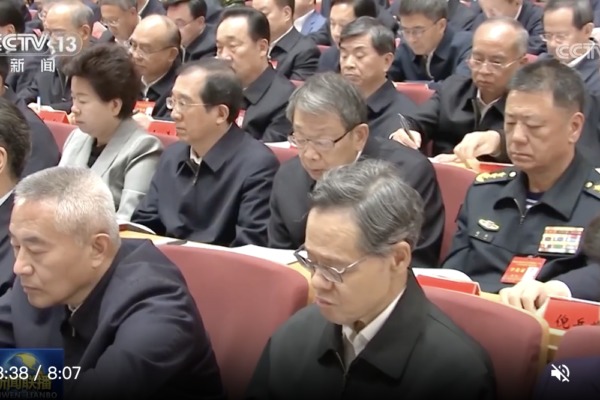Illustrative image: The Hong Kong Central waterfront. (Song Bilong/Dajiyuan)
[People News] On Tuesday, November 19, Hong Kong’s High Court sentenced all 45 pro-democracy activists convicted of "conspiring to subvert state power" to prison terms ranging from 4 to 10 years. This is the largest trial under Hong Kong’s National Security Law and has drawn criticism from countries including the United States and Australia.
According to Voice of America, 47 pro-democracy activists were arrested in 2021 and charged under Beijing’s National Security Law for allegedly conspiring to subvert state power. In a landmark trial earlier this year in May, 14 defendants were found guilty, 31 pleaded guilty, and 2 were acquitted.
In Tuesday’s judgment, former legal scholar Benny Tai was sentenced to 10 years in prison, marking the harshest sentence handed down since Beijing imposed the National Security Law in 2020 to suppress dissent. The court noted that Tai published a series of articles advocating his ideas, which were deemed to "essentially promote revolution."
Young activist Owen Chow received the second-longest sentence, 7 years and 9 months, as the court determined he played a "more proactive role in the plan compared to other defendants."
Prominent pro-democracy figures, including Au Nok-hin, Kwok Ka-ki, Chung Kim-lun, and Australian citizen John Clancey, were also identified as organizers and received sentences of up to 7 years and 3 months.
The remaining 40 defendants received sentences ranging from 4 years and 2 months to 6 years and 9 months. Notable sentences include: Former lawmakers Lam Cheuk-ting and Leung Kwok-hung ("Long Hair") were sentenced to 6 years and 9 months. Helena Wong received 6 years and 6 months. Alvin Yeung received 5 years and 1 month. Wu Chi-wai and Eddie Chu were sentenced to 4 years and 5 months each. Claudia Mo, Jeremy Tam, Kwok Ka-ki, and Ray Chan each received 4 years and 2 months.
Former Demosisto Secretary-General Joshua Wong was sentenced to 4 years and 8 months in prison, while former Civil Human Rights Front convener Jimmy Sham received a sentence of 4 years and 3 months.
Journalist Gwyneth Ho, who was sentenced to 7 years, wrote on Facebook: "For Beijing, our real crime is that we refuse to settle for participating in manipulated elections."
"We dared to pose this question to the regime: Is democracy possible under such a system? The answer has been comprehensive repression across all aspects of society," Ho said.
The courtroom was packed.
From early Tuesday morning, hundreds of people lined up outside the courthouse, many holding umbrellas in light rain, hoping to secure a seat in the main courtroom or one of the overflow rooms.
Hong Kong authorities deployed heavy police presence around the West Kowloon Magistrates' Courts and nearby streets, including police dogs, armored vehicles, and flashing lights. Some individuals were searched and questioned.
Former Hong Kong Civic Party District Councillor Edith Wong, who attended the sentencing, told AFP that the sentences "encourage people to plead guilty and testify against their peers." She added, "For those who refuse to be tamed, the punishment is clearly harsher."
A spokesperson for the U.S. Consulate General in Hong Kong and Macau stated on Tuesday that the defendants were harshly prosecuted and imprisoned for peacefully participating in normal political activities, which are protected under Hong Kong’s Basic Law. The U.S. strongly condemned this development.
Roxie Houge, head of the political section at the U.S. Consulate in Hong Kong, spoke outside the courthouse, condemning Hong Kong’s continued prosecution of individuals for expressing political opinions and exercising free speech.
Marco Rubio, nominated as Secretary of State by incoming U.S. President Donald Trump, has been a vocal critic of the trial. Earlier this year, he issued an open letter calling the convictions evidence of the Chinese Communist Party's use of the National Security Law to "comprehensively undermine Hong Kong’s autonomy, rule of law, and fundamental freedoms."
Australian Foreign Minister Penny Wong expressed strong opposition to the CCP and Hong Kong authorities’ continued broad implementation of the National Security Law. She voiced "grave concerns" over the sentences and called on the CCP to "stop suppressing freedoms of speech, assembly, media, and civil society in Hong Kong."
The Taiwanese Presidential Office issued a statement declaring "Democracy is not a crime," and strongly condemned the CCP for using judicial means and unfair procedures to suppress the political participation and free speech of Hong Kong’s pro-democracy activists. Taiwan pledged to continue standing in solidarity with Hong Kong. Similar statements were released by Taiwan’s Ministry of Foreign Affairs, Mainland Affairs Council, and the ruling Democratic Progressive Party (DPP).
Chinese Foreign Ministry spokesperson Lin Jian stated on Tuesday that Hong Kong is a "society ruled by law" where laws must be followed and violations prosecuted. "No one can engage in illegal activities under the guise of democracy and attempt to evade legal consequences," he claimed.
Lin asserted that the Central Government "firmly supports" Hong Kong's efforts to safeguard national security, punish activities endangering national security in accordance with the law, and "resolutely opposes interference in China's internal affairs by certain Western countries under the guise of judicial cases."
The Taiwanese Presidential Office reiterated its stance, emphasizing that democracy and freedom are universal values and pledging to continue standing with Hong Kong.











News magazine bootstrap themes!
I like this themes, fast loading and look profesional
Thank you Carlos!
You're welcome!
Please support me with give positive rating!
Yes Sure!